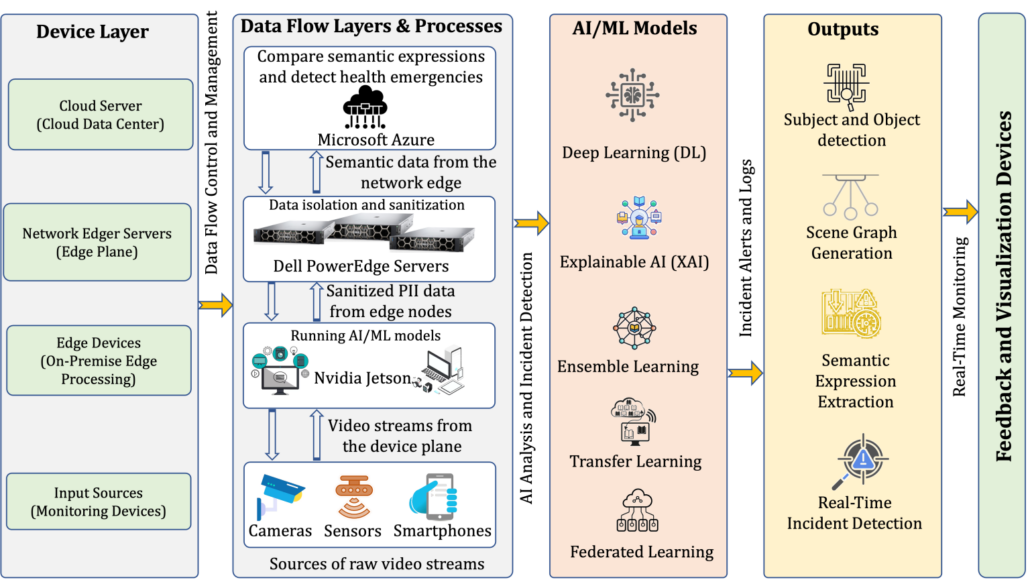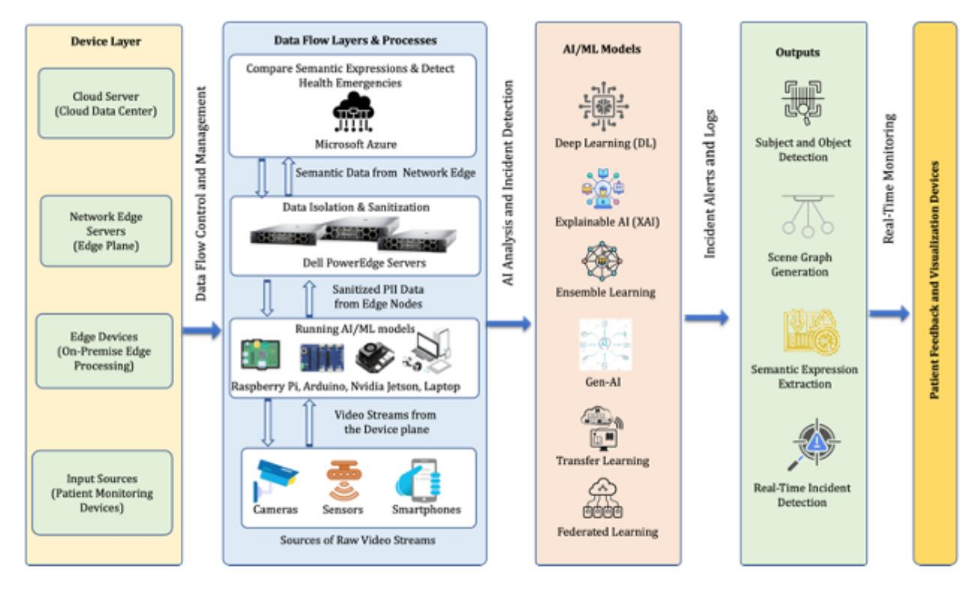- Programs Overview
- Admissions and Aid
- About Us
- Research
- Research Labs and Funded Projects
- Genomics Lab
- SACS Cybersecurity Research Center
- SACS X-Trust CPS Lab
- SACS Saha RESONANCE Lab
- SACS Mixed Extended-Reality and Twin Research and Immersive X-Systems (METRIX) Lab
- Population Health Informatics and Disparities Research Lab (PHIDL)
- Intelligent Cognitive Profiling Lab (ICP)
- Geographic Information Systems and Visualization Lab
- Data-driven Intelligence and Security for Cyber-physical Systems (DISCS) Lab
- Clinical Trials and Outcomes Innovation Lab
- SACS Cyber-AI for Sustainable Planetary Ecosystem Resilience (CASPER)
- CAP: Capacity Building for Trustworthy AI in Medical Systems (TAIMS)
- Maternal Health Informatics and Disparities (HRSA Grant UR650342)
- Collaborate with us
- Advanced Computing and Analytics Laboratory
- Student Research Opportunities
- Faculty Grant Proposals
- Research Services
- Research Labs and Funded Projects
- Resources
- Departments
Data-driven Intelligence and Security for Cyber-physical Systems (DISCS) Lab

Director
Uttam Ghosh, Ph.D.
Associate Professor of Cybersecurity
The primary goals of DISCS Lab are to advance research in cybersecurity and cyber-physical systems (CPS), focusing on developing secure, efficient frameworks using emerging technologies such as artificial intelligence, machine learning, the Internet of Things, 5G& beyond softwarization and edge-cloud computing.
The lab is dedicated to creating privacy-preserving, low-latency solutions for healthcare systems, leveraging advanced AI/ML approaches to enhance security, data processing and network performance. Additionally, DISCS Lab is committed to designing and implementing cutting-edge educational programs in cybersecurity and data science, exemplified by the newly developed Master of Science in Cybersecurity Assurance program, aimed at addressing critical gaps in the field. Supported by prestigious grants from NSF, NSA, DoD, DoE, and Novartis, the lab’s research initiatives are at the forefront of both theoretical and applied advancements in cybersecurity and emerging technologies. By fostering a collaborative environment, DISCS Lab strives to make a significant impact on the future of secure, connected systems that benefit both academia and society.

Objectives
- Research and Engineering
The DISCS Lab focuses on developing next-generation cybersecurity solutions by integrating advanced technologies such as 5G&B, IoT, SDN, edge-cloud, and Quantum with AI/ML tools. The goal is to create secure, efficient, and resilient digital ecosystems that ensure dependability and robustness in cyber infrastructures across critical sectors, including healthcare, finance, and defense.
- Education and Workforce Development
DISCS Lab focuses on building and sustaining a skilled workforce through public awareness initiatives, graduate and K-12 education, and outreach activities.
- Expanding Engagement
A broad and engaged community is crucial for advancing research and education in cybersecurity and AI/ML.
Lab Members:
Post Doctoral Fellow
Debashis Das, Ph.D.
Current Students
- La Chiara Landrum
- Dario Perez
- Loni Taylor
- Issac Thomas
- Xiangye Xiao
Past Students:
- Saul Ashley
- Jacquese Starling
Collaborators
Internal
Eugene Levin, Ph.D.
Professor, Biomedical Data Science
Meharry Medical College
Sajid Hussain, Ph.D.
Professor, Computer Science and Data Science
Meharry Medical College
Lei Qian, Ph.D.
Associate Professor, Computer Science and Data Science
Meharry Medical College
Pushpita Chatterjee, Ph.D.
Assistant Professor, Computer Science and Data Science
Meharry Medical College
Asmah Muallem, Ph.D.
Assistant Professor, Computer Science and Data Science
Meharry Medical College
External
Dr. Saptarshi Debroy
Associate Professor of Computer Science
Hunter College and CUNY, NY
Saraju Mohanty, Ph.D
Professor
University of North Texas, Denton
Dr. Danda B Rawat
Professor
Howard University
Dr. Sachin Shetty
Professor
Old Dominion University
News Feed
[news feed doesn’t exist yet]
Edge Cloud Testbed

Research areas
Cyber Infrastructure and Information Security: Securing modern cyber infrastructure is crucial in an era where digital transformation is reshaping critical sectors such as healthcare, finance and defense. While traditional cloud computing approaches offer computational resources for healthcare applications, they suffer from inherent limitations such as latency in data transfer, privacy risks and potential data unavailability. The DISCS Lab focuses on designing scalable, resilient and privacy-preserving security frameworks that integrate AI-driven threat intelligence, zero-trust architectures, and blockchain-based authentication to protect today’s cyber infrastructure. By leveraging cutting-edge technologies like 5G&B, IoT, SDN, edge computing, and cloud, alongside AI/ML tools, the lab aims to provide efficient, secure, and privacy-preserving data communication and processing. This ensures low-latency, secure data exchanges for real-time applications, like a health emergency alert system for an assisted living setting, while promoting the development of secure, resilient digital ecosystems and reinforcing trust and integrity in cyber infrastructure.
Adversarial, Generative AI, and AI-Driven Cyber Analytics: The DISCS Lab focuses on addressing adversarial threats to AI-driven cybersecurity by developing robust defense mechanisms, secure generative AI models, and privacy-preserving techniques like synthetic data augmentation. These innovations enhance model generalization and mitigate risks like data poisoning. DISCS Lab also leverages AI/ML for real-time threat detection, predictive risk assessment, and automated intelligence through advanced AI/ML models, anomaly detection and deep learning. By integrating graph neural networks (GNNs), reinforcement learning, and explainable AI (XAI), the lab aims to improve the transparency, scalability, and adaptability of AI-powered cybersecurity frameworks, ensuring resilience for critical infrastructures, such as healthcare and finance, against evolving adversarial tactics.
Human-Machine Teaming and Tactical Intelligence: In mission-critical applications, collaborative intelligence between humans and AI systems is essential for enhanced decision-making. DISCS Lab integrates AI, multimodal data fusion, and reinforcement learning-based adaptive decision support systems to improve human-machine teaming in defense, emergency response, and healthcare. The lab focuses on situational awareness models that leverage edge-AI and real-time cyber analytics to provide actionable intelligence in high-stakes scenarios. DISCS Lab is pioneering advancements in tactical intelligence, enhancing autonomous decision-making and cyber resilience in military, emergency response and healthcare applications.
Quantum Machine Learning and Post-Quantum Cryptography: Quantum computing advancements present both opportunities and risks to cybersecurity. DISCS Lab focuses on developing quantum-resistant cryptographic algorithms, quantum-enhanced AI models and post-quantum security frameworks to protect cyber-physical systems from future quantum threats. Key research areas include lattice-based cryptography, quantum key distribution (QKD) and hybrid classical-quantum AI models. The lab is committed to exploring quantum-safe cryptographic solutions, ensuring long-term security for AI-driven, distributed and IoT-enabled infrastructures against the emerging challenges of quantum computing.
Publications
List of publication is available on Google Scholar and ORCID.
Invited Talks
- “EmpoweringSecureandPrivacy-PreservingDataSharinginIntelligentHealthcareSystems,”BlockSecSDN’2024: 4th International Workshop on Blockchain for Secure Software-defined Networking in Smart Communities in conjunction with IEEE ICC 2024, June 9 – 13, Denver, CO, USA.
- “Federated Edge-Cloud Framework for Heart Disease Risk Prediction Using Blockchain,” in 6th IFIP-IoT, 2023.
- “Security and Privacy in Cyber Physical Systems,” Tech Talk’23, Air Force Research Laboratory (AFRL), Griffiss Institute, Rome, NY, 2023.
- Secure Softwarized Next Generation Networking for CPS and IoT,” The 2022 Southeast Symposium on Contemporary Engineering Topics (SSCET), University of Arkansas at Little Rock, 2022.
- “Secure Softwarized Networks for Next Generation CPS & IoT,” organized by IEEE Student Branch, IIT Kharagpur, 2022.
- “Secure Softwarized CPS and IoT: A Deep Dive”, in IEEE 2ND International Conference on Advances in Computing, Communication, Embedded and Secure Systems, 2021, India.
- “An Introduction to Softwarized Internet of Things and 5G”, in “SWMLIT: Summer Workshop cum Internship on Machine Learning Applications to Internet of Things”, IIT BHU, 2020.
- “An Improved Communications in Cyber Physical System Architecture, Protocols and Applications”, IEEE SECON STP-CPS 2019, Boston, Massachusetts, USA.
- “A Novel Grid based Approach for Handwritten Text Segmentation”, IEEE SouthEastCon 2019, Huntsville, Alabama, USA.
- “EFA-An efficient algorithm for front allocation in non-dominated sorting”, IEEE ISSPIT 2018, Louisville, Kentucky, USA.
- “Model-driven Automated and Adaptive Deployment Techniques for Secure Cyberinfrastructures”, SSCET & UAH Engineering Forum, Huntsville, AL, 2018.
- “An Introduction to Software Defined Networking, Vanderbilt University, TN, USA, 2017.
- “A Security Framework for SDN-enabled Smart Power Grids”, IEEE ICDCS, GA, USA, 2017.
- “Towards a Resilient Smart Grid using Software Defined Networking” IIIT-Bangalore, IN, 2016.
- “A Secure Addressing Scheme for Large-Scale Managed MANETs”, ADSC, Singapore, 2015.
- “Software Defined Networking”, GARUDA-NKN Meet, IISC Bangalore, IN, 2015.
- “Secure Addressing in Mobile Ad Hoc Networks”, NIT, Calicut, Kerala, 2015.
- “Introduction to Wireless LANs”, CDAC, Electronics City, Bangalore, IN, 2014.
- “Simulator/Testbed of Communication Networking”, Dept. of E&ECE, IIT Kharagpur, 2014.
- “Identity based Schemes for Securing Mobile Ad Hoc Networks”, IEEE Kharagpur Section, IN, 2012.
- “Identity Based Schemes for Securing Mobile Ad Hoc Networks”, IEEE IPDPS, 2012, Shanghai, China, 2012.
- “ A Novel Signature Scheme to Secure Distributed Dynamic Address Configuration Protocol in Mobile Ad Hoc Networks”, IEEE WCNC, Paris, France, 2012.
- “Identity based Secure AODV and TCP for Mobile Ad Hoc Networks”, ACM ACWR, Kerala, India, 2011.
- Programs Overview
- Admissions and Aid
- About Us
- Research
- Research Labs and Funded Projects
- Genomics Lab
- SACS Cybersecurity Research Center
- SACS X-Trust CPS Lab
- SACS Saha RESONANCE Lab
- SACS Mixed Extended-Reality and Twin Research and Immersive X-Systems (METRIX) Lab
- Population Health Informatics and Disparities Research Lab (PHIDL)
- Intelligent Cognitive Profiling Lab (ICP)
- Geographic Information Systems and Visualization Lab
- Data-driven Intelligence and Security for Cyber-physical Systems (DISCS) Lab
- Clinical Trials and Outcomes Innovation Lab
- SACS Cyber-AI for Sustainable Planetary Ecosystem Resilience (CASPER)
- CAP: Capacity Building for Trustworthy AI in Medical Systems (TAIMS)
- Maternal Health Informatics and Disparities (HRSA Grant UR650342)
- Collaborate with us
- Advanced Computing and Analytics Laboratory
- Student Research Opportunities
- Faculty Grant Proposals
- Research Services
- Research Labs and Funded Projects
- Resources
- Departments
